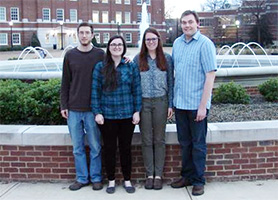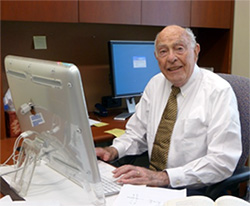
|

TMS 101: Fundamentals of TMS
Date: Sunday, February 26, 2017
Time: 5:00 p.m. to 5:45 p.m.
Location: Marriott Marquis & Marina, Mission Hills
Sponsored by: TMS Professional Development Committee
Want to get more involved in TMS, but don’t know where to start? Attend TMS 101: Fundamentals of TMS. This half-hour presentation will provide a brief overview of how TMS works and a concise, practical explanation of how you can get more involved in the society’s activities. Led by experienced TMS volunteers, TMS 101 will help you to take advantage of the many networking and professional development opportunities within the organization.
 Jeffrey W. Fergus
Jeffrey W. Fergus - Auburn University
 Clarissa Yablinsky
Clarissa Yablinsky - Los Alamos National Laboratory
 Juan Pablo Escobedo-Diaz
Juan Pablo Escobedo-Diaz - University of New South Wales, Canberra
This session is open to all TMS2017 attendees but will be especially valuable to new members, international members, and graduate students.
Light Metals Keynote Session
Date: Monday, February 27, 2017
Time: 8:30 a.m. to 10:00 a.m.
Location: Room 1A, San Diego Convention Center
Organizer: Edward Williams, Alcoa
This opening keynote session, featuring talks from invited speakers, will kick off the light metals programming at TMS2017.
 "Alcoa Perspectives on the Global Aluminum Industry"
Agnello Borim - Smelting VP Technology & Strategy, Alcoa, Brazil
 "Rio Tinto Perspectives on the Global Aluminum Industry"
Vincent Christ - Vice-President, Technology & Project Development – Aluminium, Rio Tinto, Canada
 "Arconic Perspectives on the Global Aluminum Industry"
Moustapha Mbaye - President – Technology, Engineering and Operational Excellence, Arconic, USA
Magnesium Technology Keynote Session
Date: Monday, February 27, 2017
Time: 8:30 a.m. to Noon
Location: Room 5A, San Diego Convention Center
Organizers: Kiran N. Solanki, Arizona State University; Dmytro Orlov, Lund University; Alok Singh, National Institute for Materials Science, Japan; Neale R. Neelameggham, Ind LLC
View Included Presentations
- "Multi-scale Investigation on Yield ‘Symmetry’ and Reduced Strength Differential in an Mg-Y Alloy"
Enrique Lavernia, University of California Davis, USA
- "Targeting High Impact R&D for Automotive Magnesium Alloys"
William Joost, U.S. Department of Energy, USA
- "Magnesium Development as a Lightweight Material – In Competition with Other Structural Materials"
Alan Luo, The Ohio State University, USA
- "The Continued Quest for Low-temperature Formability in Mg Alloys: Historical Developments and Future Opportunities"
Suveen Mathaudhu, University of California Riverside, USA
Student-Run Symposium: Building Bridges – Connecting Academic and Industry Research  Date
Date: Monday, February 27, 2017
Time: 8:30 a.m. to 4:30 p.m.
Location: San Diego Convention Center, Room 22
Organizers: Katherine Vinson, The University of Alabama; Omar Rodriguez, The University of Alabama; Ben White, The University of Alabama; Dallin Barton, The University of Alabama; Rachel White, The University of Alabama
This symposium, arranged by graduate students, will focus on the link between academia and industry research. Relationships between academic institutions and advancing technologies in industry are challenging to navigate because the two have traditionally been seen as distinctly separate research entities. The symposium will address this separation and provide a foundation to explore opportunities for mutually beneficial academic and industry partnerships.
Additive Manufacturing: Past, Present, and Future Keynote Session
Date: Monday, February 27, 2017
Time: 2:00 p.m. to 5:30 p.m.
Location: Room 7A, San Diego Convention Center
Organizers: John S. Carpenter, Los Alamos National Laboratory; James Foley, Los Alamos National Laboratory; Eric A. Lass, National Institute of Standards and Technology; Mark R. Stoudt, National Institute of Standards and Technology
Additive Manufacturing (AM) encompasses techniques where component fabrication is performed through the addition of material via a digital transfer of shape and process information. This inaugural joint keynote session is comprised of talks that represent the three Additive Manufacturing-related symposia at TMS2017: "Additive Manufacturing of Metals: Establishing Location Specific, Processing-Microstructure-Property-Relationships," "Additive Manufacturing: Building the Pathway towards Process and Material Qualification," and "Pioneers in Additive Manufacturing."
View Included Presentations
- "The New Metallurgy of Additive Manufacturing"
Thomas Starr, University of Louisville, USA
- "Laser Engineered Net Shaping (LENS™): Past, Present and Future"
David Keicher, Sandia National Laboratories, USA
- "Additive Manufacturing Machines from the University of Texas at Austin"
Joseph Beaman, University of Texas, USA
- "Location Specific Control of Solidification Microstructure across AM Alloys and Processes"
Jack Beuth, Carnegie Mellon University, USA
- "Unraveling Out-of-equilibrium Phase and Microstructure Formation in Alloys towards Alloy Design for Additive Manufacturing"
Christian Leinenbach, Empa-Swiss Federal Laboratories for Materials Science and Technology, Switzerland
- "The Move to Multifunctionality: Additive Manufacturing of Graded and Multimaterial Structures"
Christopher Tuck, University of Nottingham, United Kingdom
A Prospective Look at the MGI after Five Years
Date: Monday, February 27, 2017
Time: 3:30 p.m. to 5:30 p.m.
Location: Room 9, San Diego Convention Center
Sponsored by: TMS Materials Innovation Committee
Organizers: Charles H. Ward, Air Force Research Laboratory; Kevin Hemker, Johns Hopkins University; John Allison, University of Michigan
The Materials Genome Initiative (MGI) was launched in the United States just over five years ago. While the initiative calls for revolutionary advances in the speed and cost to market for materials, it reflects a confluence of new capabilities in science and engineering enabled by evolutionary advances in advanced experimental techniques, theory, modeling, computational power, and digital storage and communication over the past several decades. MGI’s strategic plan sets four national goals that call for Enabling a Paradigm Shift in Culture, Integrating Experiments, Computation, and Theory, Facilitating Access to Materials Data, and Equipping the Next-Generation Materials Workforce. This symposium will examine the successes of the MGI to date against these goals and will provide an outlook on where materials science and engineering is headed over the next five years in this context.
View Included Presentations
- "Spatiotemporally Integrated Theory, Computation and Experiments: A Frontier of the Materials Genome Initiative"
Dennis Dimiduk, BlueQuartz Software, LLC, USA
- "The Materials Genome Initiative – Leading a Culture Shift in Materials Research"
Kevin Anderson, Brunswick Corporation, USA
- "Democratizing Large-scale Data and Machine Learning in Materials Research"
Bryce Meredig, Citrine Informatics, USA
- "The Materials Genome after Five Years: An Academic Perspective"
Tresa Pollock, University of California Santa Barbara, USA
Pioneers in Additive Manufacturings
Date: Tuesday, February 28, 2017
Time: 8:30 a.m. to 5:30 p.m.
Location: Room 8, San Diego Convention Center
Organizers: James Foley, Los Alamos National Laboratory; Paul D. Prichard, Kennametal Inc.; Iver E. Anderson, Iowa State University/Ames Laboratory; David L. Bourell, University of Texas at Austin
Additive manufacturing (AM) in the last few years has seen a significant increase in activity due to renewed industrial interest and government encouragement of several types of public/private partnerships, especially in the metals area. While AM is a relatively new materials processing technology, its roots go back at least a couple decades when it was a new processing research area, described as "3-D Printing" or "Rapid (Metal) Prototyping." Many of the people who are currently innovating new materials solutions and applications were infants or not born yet when key processing problems were being solved. While some of the pioneering work was conducted with stereo lithography of polymers, many of the process technologies for metal "freeform fabrication" were an extension of thermal spray deposition, atomization spray deposition, laser cladding, various welding (e.g., hard-facing build-up) processes, and binder-assisted powder metal sintering. This symposium intends to invite pioneers in the field of additive manufacturing along with current innovators in the field to present ground-breaking work that solved materials problems and enabled highly advanced manufacturing production. Contributed papers highlighting past, current, or future problems and solutions in AM also are encouraged.
View Included Presentations
- "A History of Additive Manufacturing"
David Bourell, University of Texas, USA
- "3DP Retrospective: Do Inventors Know What They Are Doing?"
Michael Cima, MIT, USA
- "Assent and Decline of LOM Technology"
Michael Feygin, Cubic Technologies, Inc., USA
- "Laser Deposition of Metallic Powders"
Hamish Fraser, The Ohio State University, USA
- "Directed Light Fabrication: A Near-Net Shape Process using Laser Assisted Metal Deposition"
Dan Thoma, University of Wisconsin-Madison, USA
- "Development of Laser-powder Metal Additive Manufacturing for Industry: Historical Perspective, Current and Future Applications"
James Sears, GE GRC, USA
- "Pioneering International Consensus"
Brent Stucker, 3DSIM, USA
- "Making Things Bit-by-byte: Opportunity in a Fortuitous Convergence of Technologies"
Khershed Cooper, National Science Foundation, USA
- "Early Developments of AM within the UK"
Phill Dickens, University of Nottingham, United Kingdom
- "Laser Engineered Net Shaping - AM Metal Parts with Exceptional Material Properties"
John Smugeresky, Additive Manufacturing Materials Consultants, USA
- "AFRL Contributions to Additive Manufacturing of Titanium, ca 2000"
Pamela Kobryn, U.S. Air Force Research Laboratory, USA
- "Process Fundamentals for Selective Laser Melting: Power Ratio, Melting, Porosity, and Build Properties"
Ralph Napolitano, Iowa State University, USA
TMS2017 Acta Materialia Symposium
Date: Tuesday, February 28, 2017
Time: 3:15 p.m. to 4:55 p.m.
Location: San Diego Convention Center, Room 22
This special symposium will honor three TMS members who will be accepting their prestigious Acta Materialia Awards at the TMS 2017 Annual Meeting & Exhibition. The session will include the following presentations by the award recipients:
Acta Materialia Gold Medal Lecture:
 "Dynamic Transformation of Austenite at Temperatures Well Above the Ae3"
John Jonas - McGill University
Acta Materialia Silver Medal Lecture:
 "Advanced Ceramics for Environmental Protection Materials in Extreme Conditions"
Jingyang Wang - Institute of Metal Research, Chinese Academy of Sciences
Acta Materialia Hollomon Award for Materials and Society Lecture:
 "Advanced Materials Manufacturing for Global Mobility"
Warren Poole - University of British Columbia
 Date
Date: Wednesday, March 1, 2017
Location: Room 22, San Diego Convention Center
Organizer: James A. Warren, National Institute of Standards and Technology
This one-day symposium will feature a series of invited talks on the extraordinary career in materials science of John W. Cahn. Cahn’s pioneering research in the thermodynamics and kinetics of materials provided profound insights, yielding a consequent capability to rationally engineer matter.
View Included Presentations
- "Dislocations, Trijunctions and Grain Rotation"
Peter Voorhees, Northwestern University, USA
- "A DSC Model for Grain Boundary Migration and Properties"
David Srolovitz, University of Pennsylvania, USA
- "Thin Film Grain Growth for Twin Related Orientations of Grains"
John Blendell, Purdue University, USA
- "Experimental Measures of Stress-coupled Boundary Migration and the Attendant Mechanical Behavior of Nanocrystalline Films"
Kevin Hemker, Johns Hopkins University, USA
- "Energetic Trends for Twin Boundaries in HCP Metals"
Mark Asta, University of California Berkeley, USA
- "Molecular Dynamics Simulations of Faceted, Incoherent Twin Boundaries"
Elizabeth Holm, Carnegie Mellon University, USA
- "Beyond the Gorsky Effect – Exploring Larché-Cahn Open System Elasticity in Experiment"
Jörg Weissmüller, Hamburg University of Technology, Germany
- "Phase Transition and Anomalous Diffusion in Metastable ß Ti-Mo"
Srinivasan Srivilliputhur, University of North Texas, USA
- "How Some Quasicrystals Might Grow"
Jean Taylor, Professor Emerita at Rutgers University and Visiting Faculty at Courant Institute, NYU, USA
- "John Cahn and Aesthetics of Materials"
Leonid Bendersky, NIST, USA
- "Quasi-history of Quasi-crystallinity"
Olivier Hardouin Duparc, Ecole Polytechnique, France
- "John Cahn's Boss, Really?"
Lyle Schwartz, University of Maryland, USA
Applications of Process Engineering Principles in Materials Processing, Energy and Environmental Technologies
An Extraction & Processing Division Symposium in Honor of Professor Ramana G. Reddy
This symposium, which honors Professor Ramana Reddy, will provide a forum where industrial, research institutes, and university professionals can interact and exchange with other stakeholders to facilitate the advancement of materials processes and engineering. The impact of Reddy's work and achievements is in the introduction and application of process engineering principles to the quantitative description of materials processing reactions, and industrial operations. His contributions include the development of the Reddy-Blander model, by which the impurities capacities of oxide melts can be predicted a priori with the fundamental structure and thermodynamic properties data of melts. He has formulated quantitative methodologies based on first principles of thermodynamics, phase equilibria, and kinetics to: design of slags and fluxes for production and purification of metals and alloys; development of novel ionic liquid electrolytes for materials processing; design materials for Fuel Cells and Capacitors; use of thermodynamic approaches to predict thermos-physical properties of materials for industrial applications; nuclear energy waste separation and remediation; and thermal energy storage.
Frontiers in Materials Science, Engineering, and Technology
A Functional Materials Division Symposium in Honor of Sungho Jin
This symposium honors Professor Sungho Jin, recipient of the 2016 Acta Materialia Gold Medal Award and professor emeritus at the University of California–San Diego, where he was Distinguished Professor of Materials Science in the Departments of Mechanical and Aerospace Engineering and held the Iwama Endowed Chair until his recent retirement. This symposium is dedicated to Jin’s seminal research contributions, to his leadership in materials science worldwide through various professional societies, and to the University of California – San Diego. This symposium includes coverage of recent advances in electronic, magnetic, optical, superconducting materials, devices and structures, electronic packaging, and MEMS materials and devices, nano-bio materials, and energy related materials.
Materials by Design
A Materials Processing & Manufacturing Division Symposium Honoring Greg Olson on the Occasion of his 70th Birthday
The foundation of computational materials design and integration of computational materials engineering (ICME) have been pioneered by Professor Greg Olson over the last thirty years. Olson has successfully demonstrated the use of a systems design approach for designing new materials by calculating optimum composition and processing routes to achieve desired materials properties. This approach has dramatically reduced the time and cost of the alloy development process. This symposium is dedicated to Olson on the occasion of his 70th birthday. A series of invited papers will be presented on the topics of:
- Martensitic transformations
- Transformation induced plasticity and its application to ductility and fracture toughness
- Kinetics of coupled diffusional/displacive transformations
- Electronic basis of embrittlement mechanisms in metals
- Structure-property relations
- Applications of high resolution microanalysis
Mechanical and Creep Behavior of Advanced Materials
A Structural Materials Division Symposium Honoring Prof. K. Linga Murty
This symposium will celebrate the 75th birthday and life-long contributions of Professor K.L. Murty and provide a forum to discuss the present status and recent advances in research areas in which he has made seminal contributions. These areas include:
- High-temperature creep deformation of materials and micromechanistic interpretation
- Prediction of mechanical behavior of HCP metals/alloys using crystallographic texture
- Creep and fatigue behavior of microelectronic solders
- Radiation tolerance of nanostructured materials
- Development and application of ball indentation techniques as a non-destructive monitoring method of structural materials
- Characterization of dynamical behavior of point and line defects using nuclear magnetic resonance techniques
The Science of Melt Refining
A Light Metals Division Symposium in Honor of Christian Simensen and Thorvald Engh
This year, dedicated sessions in Cast Shop Technology will honor the contributions by Thorvald Engh and Christian Simensen of Norway to the science and technology of alloying practice, melt oxidation, melt characterization, and melt refining.
|